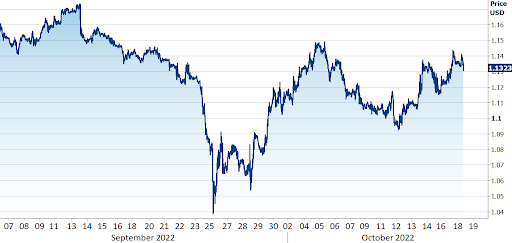What the UK government’s tax U-turn means for sterling?
( 3 min )
- Go back to blog home
- Latest
Focus in financial markets continues to remain on the UK after an extraordinary few days that have culminated in the reversal of almost all of the controversial tax cuts announced during last month’s mini-budget.
Summary:
- GBP rallies against its peers after UK government announces another budget U-turn.
- EUR/USD advances by more than 1% amid a broad improvement in risk appetite and sharp drop in European natural gas prices.
- Futures eye another 75bp rate hike from the Fed in December, but US dollar trades lower ahead of a host of FOMC member speeches this week.
Under pressure from financial markets, the media, credit ratings agencies and the electorate, Liz Truss’ government, under the stewardship of new Chancellor Jeremy Hunt, have now ditched most of the policy changes unveiled a little over three weeks ago. This includes the announcement yesterday that it was scrapping plans to cut the basic level of income tax to 19% from 20%. By our estimates, approximately 80% of the tax cuts announced on 23rd September (£32 billion) have now been reversed, with the reduction to National Insurance and stamp duty the only ones to remain in place.

This has helped buoy sterling in the past few trading sessions, with the pound briefly rallying back above the 1.14 level on the dollar on Monday, before retracing some of its gains this morning. UK bond yields have also eased, although the moves there have been far more contained, and rates remain considerably higher than they were before the budget announcement. The 10-year gilt yield, for instance, has continued to hover around the 4% level, approximately 70 basis points higher than its pre-budget levels.
Figure 1: GBP/USD (September – October 2022)

Source: Refinitv Datastream Date: 18/10/2022
We think that the above policy reversals from the government should go some, but not all, of the way to restoring confidence in UK assets, while lowering the risk of a debt spiral and removing much of the ‘mini-budget’ risk premium attached to the pound. That said, we far from expect it to be plain sailing for sterling from here on out. For one, the UK government’s credibility has taken a massive hit from the budget fiasco, and Liz Truss’ premiership is now in serious doubt. We expect pressure on her leadership to intensify in the coming days, and think that yet another change in Prime Minister is an increasingly likely scenario. Indeed, a handful of bookmakers are now assigning around a 75% implied probability that she exits the role before year-end.
The improving situation in UK financial markets led to a broad recovery in risk sentiment on Monday. EUR/USD posted strong gains during the London trading session, up over 1% for the day. A drop in European natural gas prices has partly contributed to the rally in the common currency, and European currencies in general, in the past few trading sessions. Dutch TTF gas futures are now trading at their lowest level since June, a drop of approximately 65% from the peak in August, and are almost unchanged year-to-date. The possibility of an energy shortage during the winter months remains a worry for markets, but the general consensus appears to be that rationing will be avoided, as will the worst-case scenarios for the European economy. There isn’t too much Euro Area macroeconomic data out this week, with tomorrow’s revised inflation data for September not expected to rock the boat.
In the US, attention remains firmly on expectations for Federal Reserve monetary policy. Following last week’s inflation data, which once again surprised to the upside, markets are now fully pricing in a 75bp rate hike from the FOMC in November, with around a two-in-three chance of another in December. There will be very little macroeconomic data out this week that will materially impact market pricing, so investors will likely be paying added attention to a handful of FOMC member speeches, notably from Kashari, Bullard, Bowman and Williams.
To stay up to date with our publications, please choose one of the below:
📩 Click here to receive the latest market updates
👉 Our LinkedIn page for the latest news
✍️ Our Blog page for other FX market reports
🔊 Stay up to date with our podcast FXTalk

